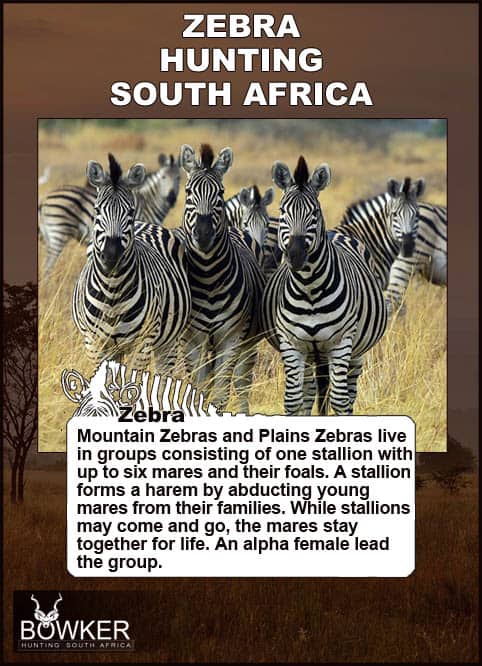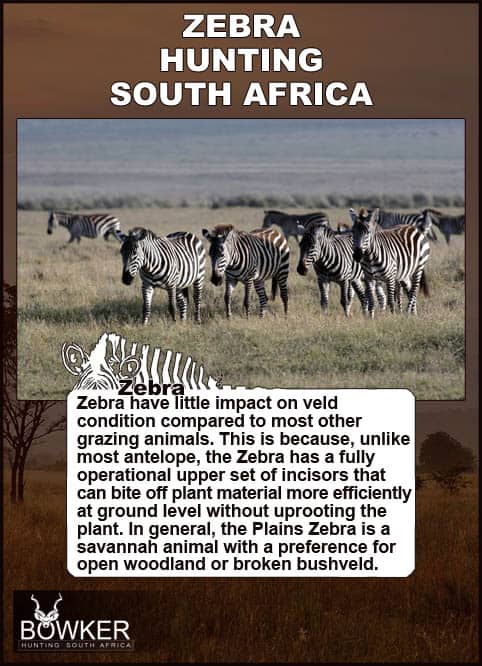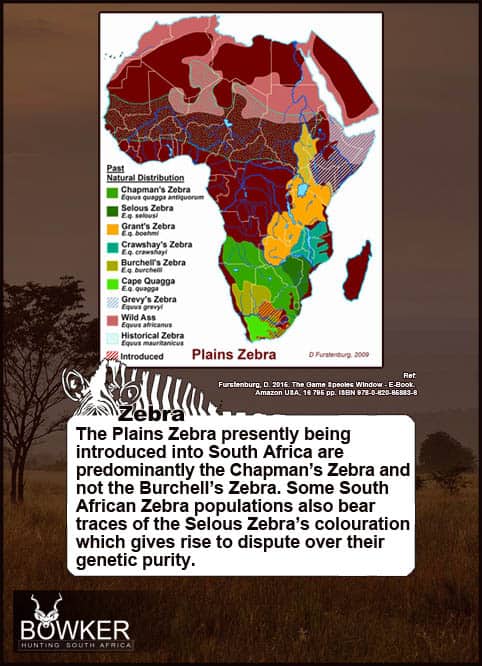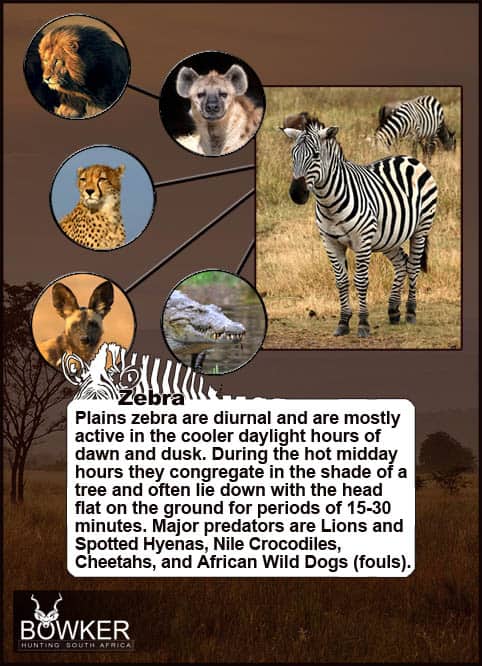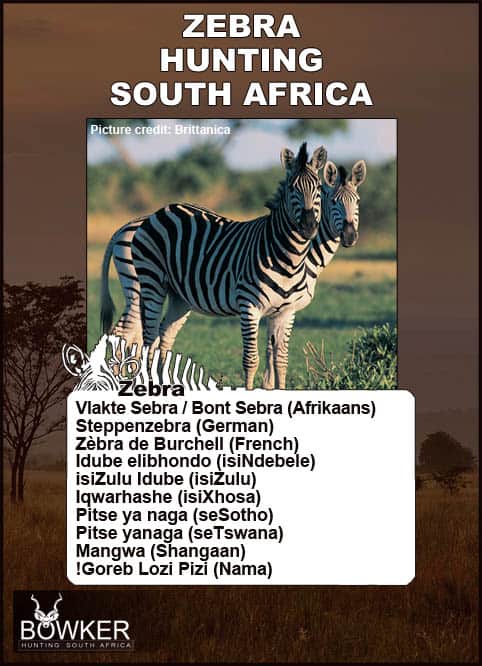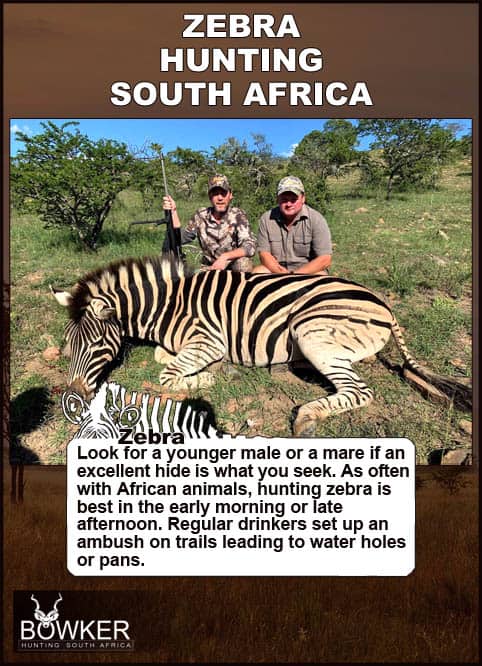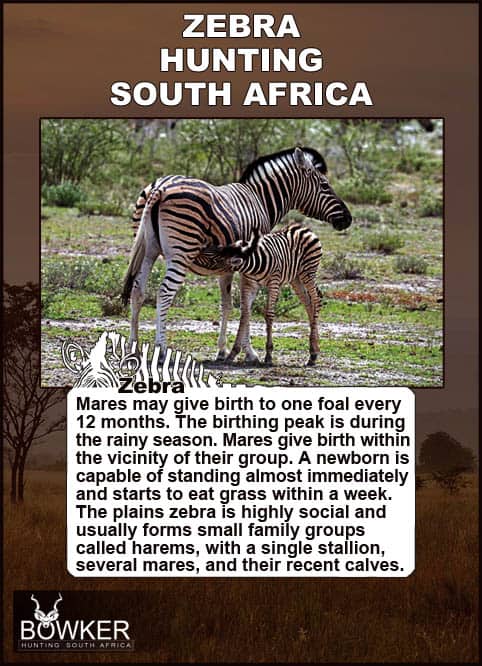
Summary
Zebra trophy hunting can prove difficult, as judging stallions from mares can be very hard.
Zebra is a remarkably tough equine family member; shot placement is critical.
There are no seasonal restrictions on hunting Zebra trophies in Eastern Cape, South Africa.
Nick Bowker Hunting offers Zebra African hunting safaris year-round.
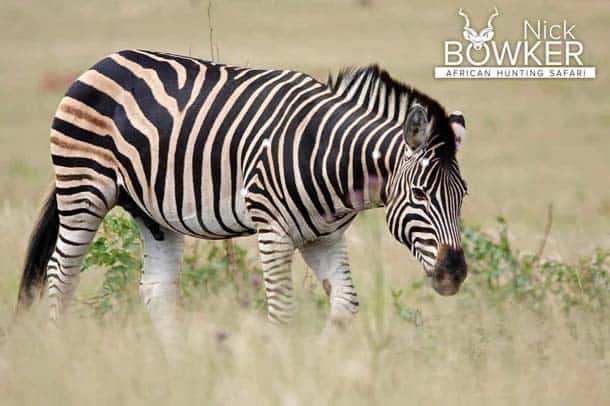
Table of Contents
Zebra Trophy Fees in South Africa – 2025
The average price of a Zebra is $1200. A zebra can be added to any African safari hunt package.
Our trophy fee for 2025 is $1200.
The Zebra trophy hunting package includes a licensed hunting guide, a hunting license, and all permits for the Eastern Cape province of South Africa.
Alternatively, we can customize a Zebra hunt package that includes other trophies.
Join us at our ranch and lodge for an unforgettable hunt experience.
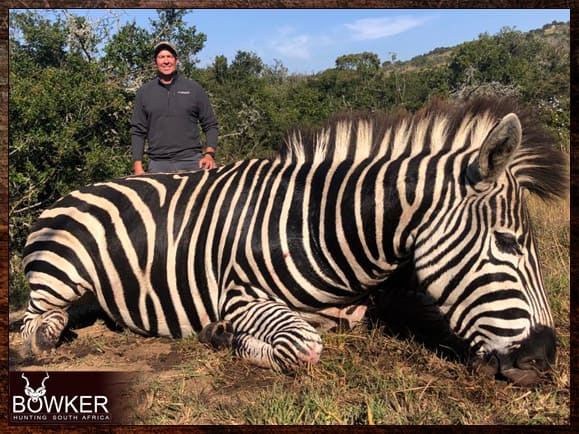
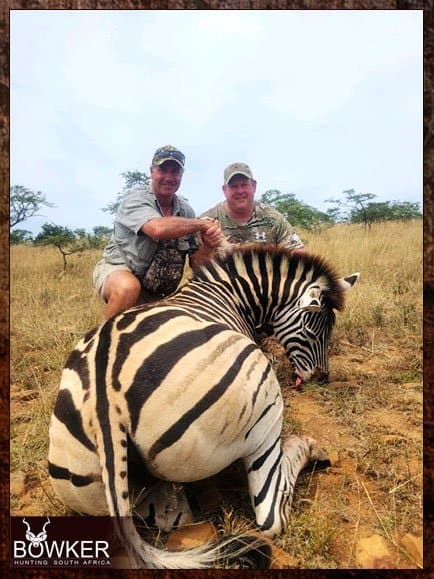
Zebra Hunts in South Africa

Shot placement must be in the bottom third of the animal directly above the front shoulder. This will ensure a heart or lung shot. Avoid head and neck shots, which are high-risk.
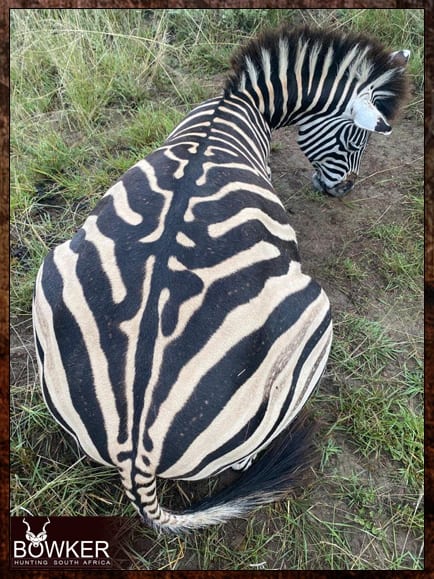
Your Zebra trophy should have an average shoulder height of around 50 inches and weigh about 800 pounds.
Zebras have been reintroduced into the Eastern Cape but are not genuinely free-ranging. Standard cattle and sheep fences impede zebras’ movement.
Zebra are relatively widely spread across the Eastern Cape. Hunts mainly use an ambush method in open country and walk and stalk techniques.
Zebra can be challenging to approach and very wild.
We offer the opportunity to hunt Zebra in several plains game packages.
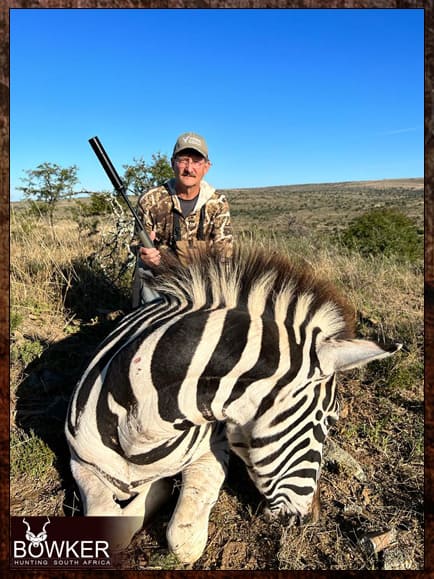
Hunting Trophy Zebra can prove difficult, as judging stallions from mares can be challenging. Hunting is done by spot and stalk.
Although the mares choose the dominant stallion, the stallion will assume his position at the back of a retreating herd, thus being closer to the point of danger, often stopping to look back.
Zebra is very resilient and tough and likely will require a follow-up shot.
Zebra provides the ideal add-on to one of our packages for the hunter, such as the kudu- Nyala Game Hunts package.
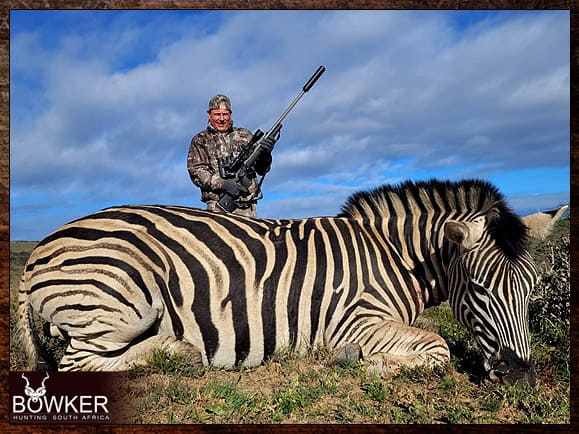
Trophy Judgement and Rifle-Caliber for Your Zebra Hunt
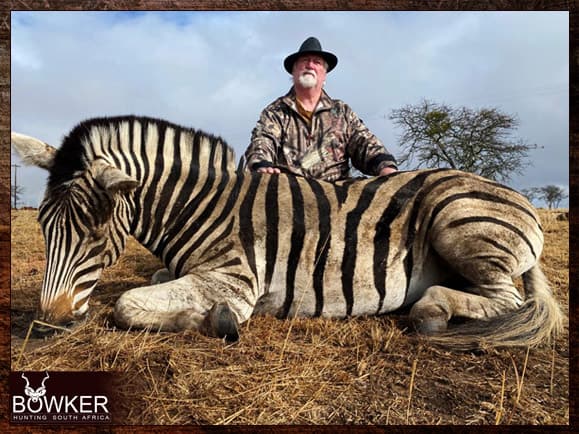
Zebra is a remarkably tough animal. Shot placement is vital; a poorly placed shot will result in a long hunt.
We recommend the 7mm or 300 Magnum calibers for your hunt.
For those who do not wish to go through the red tape of bringing a rifle into South Africa to hunt with, Nick Bowker has 300 Winchester Magnums fitted with suppressors.
We have high-end Swarovski tactical optics mounted on the rifles. We have hand-loaded Hornady ELD-X 200-grain ammunition for hunters.
This setup, including ammunition, is free of charge as part of all hunting packages. Hunt methods are mainly spot and stalk.
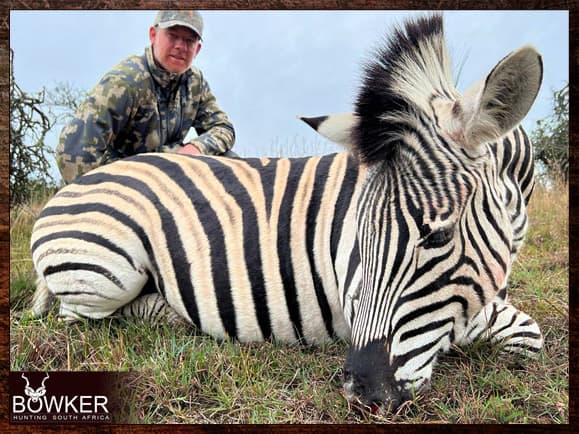
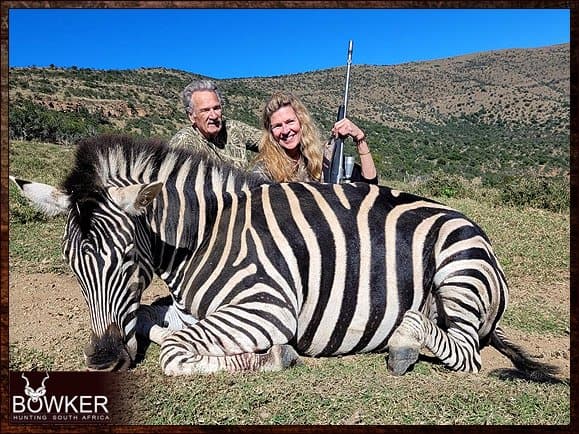
Zebra form small herds, usually 8 to 10 in number, consisting of a stallion, several mares, and their foals. Excess males leave the herd and form bachelor herds. These make for ideal hunting targets.
Good glassing is essential in trophy assessment when hunting.
If it is the flat skin you are after, the hunter should be advised that the old stallions will most likely be battle-scarred and worn and not a suitable trophy for your Zebra rug.
Zebra hunters look for a younger male or a mare if an excellent hide is what they seek. As often with African animals, hunting zebra is best in the early morning or late afternoon. They are regular drinkers.
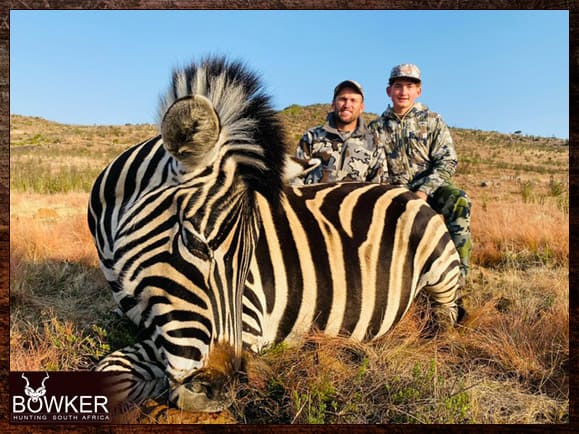
Difference Between a Male and Memale
Determining the difference between a zebra stallion and a zebra mare is no easy task. Stallions will be heavier with thicker necks. Stallions will often be at the back of the herd, protecting them against predators.

Exciting facts about the Zebra for Hunts
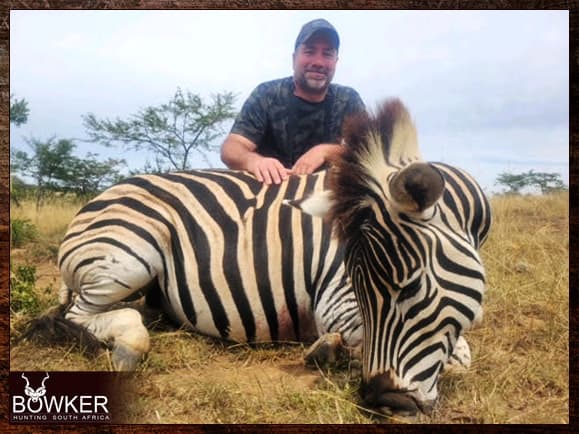
- Every zebra has a unique pattern. Scientists can use patterns like bar codes to identify individuals in a herd and keep track of them over time.
- For a long time, scientists have wondered why zebras have stripes. According to one theory, it confuses predators, making it harder for a lion to pick out an individual zebra from a stampeding herd.
- Recently, some scientists have believed that stripes keep zebras cooler. The dark bars soak up more sunlight than the light ones, which stirs up eddies of wind that swirl heat away.
- Researchers have also discovered that biting flies avoid striped patterns.
- The two theories might be linked as biting flies prefer hot temperatures, making them less likely to bite a cooler zebra.
- One of the three zebra species, the mountain zebra, was nearly extinct in South Africa but was saved by a farmer’s group.
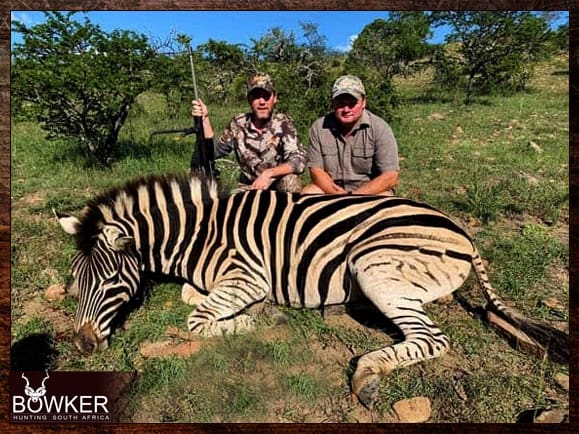
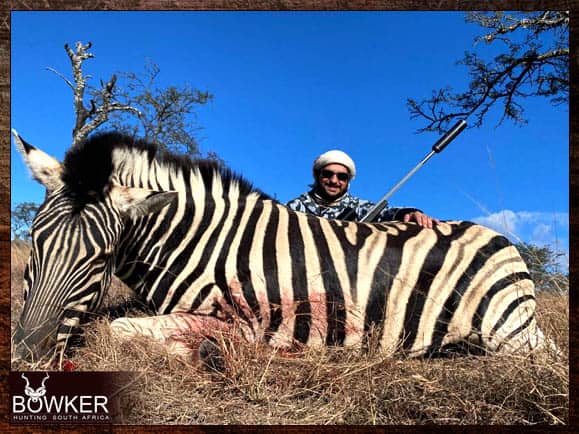
- Mountain zebra have incredibly hard, sharp hooves that help them negotiate in difficult, rugged terrain.
- And while this wild critter can’t grow a mountain man beard, it does have a bizarre, prominent neck flap called a dewlap.
- A distinctive subspecies of the plains zebra, the quagga was mostly yellow-brown and un-striped below its shoulders.
- Native to South Africa, it was driven to extinction by European settlers and hunters. The last quagga died at the Amsterdam Zoo in 1883.
- Zebras can breed with the horses. The offspring come in a fantastic variety of semi-striped patterns and are usually infertile.
- Burchell Zebra safari-style hunting can be done across South Africa.
- Zebra often associate with blue wildebeest.
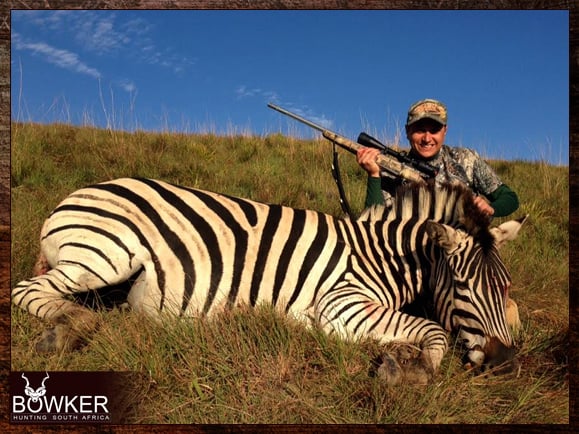
About the Zebra for Hunters
Description of Zebra
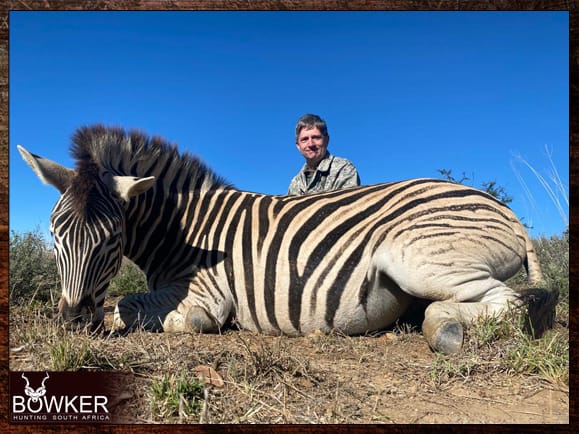
The unique stripes of zebras make them one of the animals most familiar to people. They occur in various habitats, such as grasslands, savannas, woodlands, thorny scrublands, mountains, and coastal hills.
Zebras have excellent eyesight. The Zebra’s eyes are on the sides of its head, giving it a wide field of view.
They also have night vision but are not as advanced as most of their predators.
Zebras have excellent hearing due to large, rounded ears and can turn their ears in almost any direction.
In addition to superb eyesight and hearing, zebras also have an acute sense of smell.
The eyesight of Zebra can make zebra hunting very challenging.
Highly social, Zebra live in groups called a dazzle, herd, or zeal. Stallions keep harems and their foals up to six mares.
Bachelor males live alone or form bachelors until they are old enough to challenge a breeding stallion.
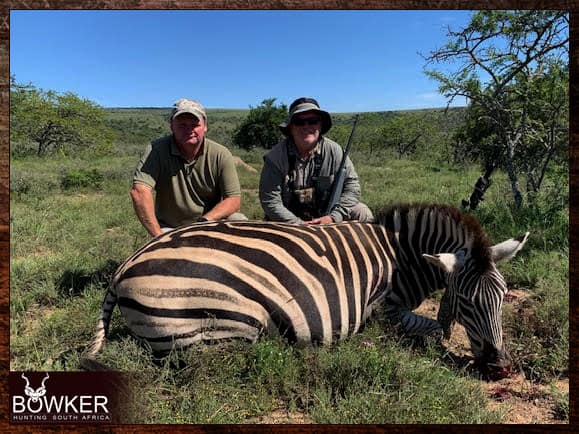
Information for Zebra hunting
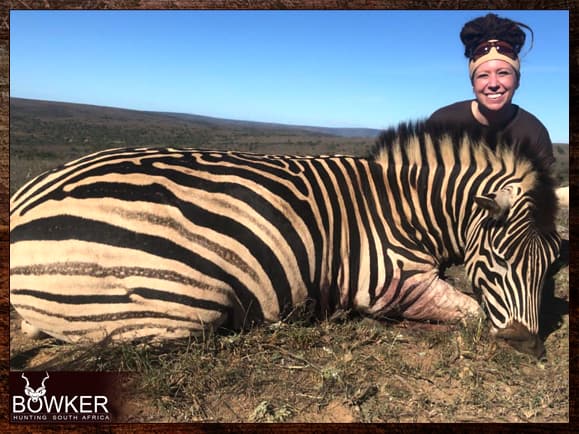
The common plains zebra species is about 47 – 51 inches at the shoulder. It can weigh up to 700 – 900 pounds, males slightly more significant than females.
- Plains zebras are the smallest, most abundant, of the horse family’s wild members. They roam across much of southeastern Africa.
- Zebra comes in all sorts of subspecies and coat variations. For example, the further south you travel across Africa, the plains zebras will have fewer stripes on their legs. Nobody is sure why, but it may have something to do with the temperature or populations of those biting flies.
- Found in Kenya and Ethiopia, Grevys zebras have a more donkey-like shape, with huge round ears. The Grevy’s zebra species is the largest wild horse family member and can weigh up to 990 pounds.
The Hartmann zebra is a sub-specie of the Mountain Zebra and is found only in Nambia and can be hunted.
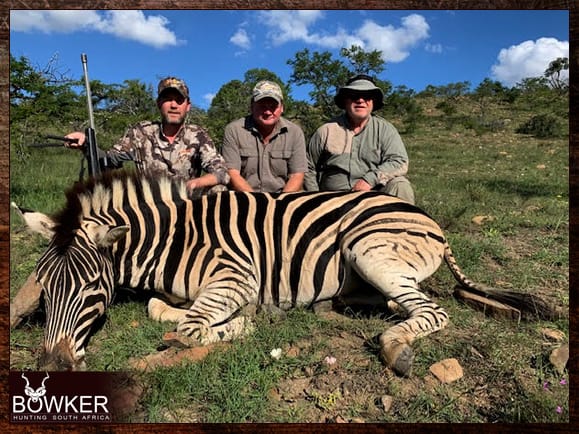
Frequently Asked Questions
How much does it cost to hunt a Zebra?
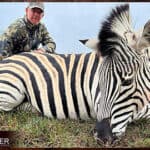
Trophy fees as a standalone Zebra are between $1,000 and $1,600. Daily hunt rates vary between $250 and $500 per day.
Included in the Zebra trophy fee is a licensed guide. As well as a hunting license and all permits.
How to hunt Zebra?
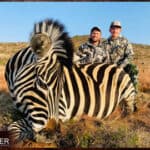
Hunts mainly use ambush techniques in open country and walk and stalk techniques.
Where do you shoot a Zebra?
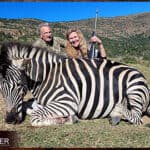
Shot placement must be in the bottom third of the animal directly above the front shoulder. This will ensure a heart or lung shot. Avoid head and neck shots, which are high-risk.
What is a trophy Zebra?
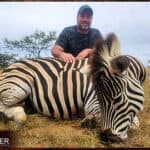
Zebra does not have a Safari Club International score. Hunting zebra can prove difficult, as judging stallions from mares can be challenging. If it is the flat skin you are after, be advised that the old stallions will most likely be battle-scarred and worn.
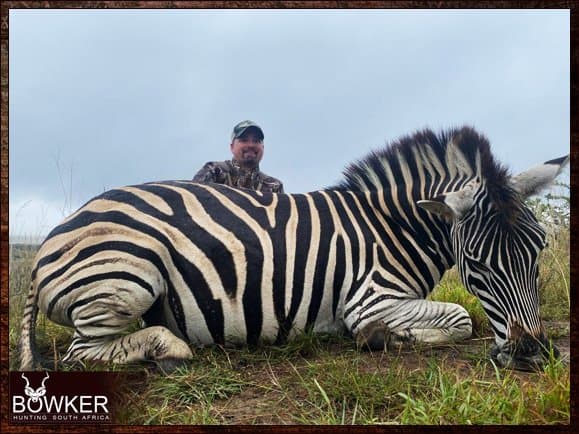
Seasonal Restrictions
When can you hunt Zebras in South Africa?
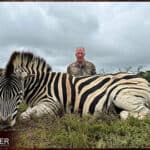
There are no seasonal restrictions on a zebra hunt in the Eastern Cape of South Africa.
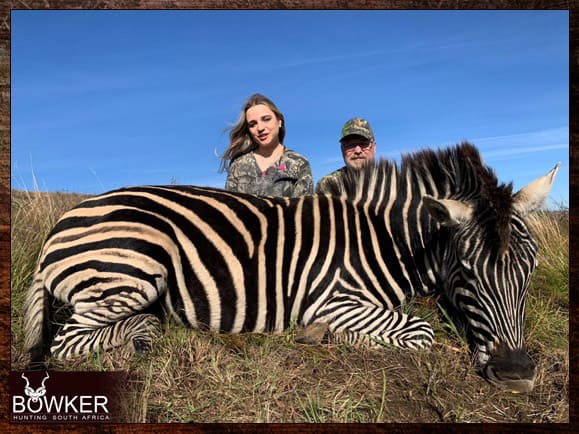
What Caliber is Recommended for Zebra Hunts?

We recommend the flat shooting 300 Winchester or 7mm magnums with high-quality tactical scopes and a suppressor.
Zebra in pictures


